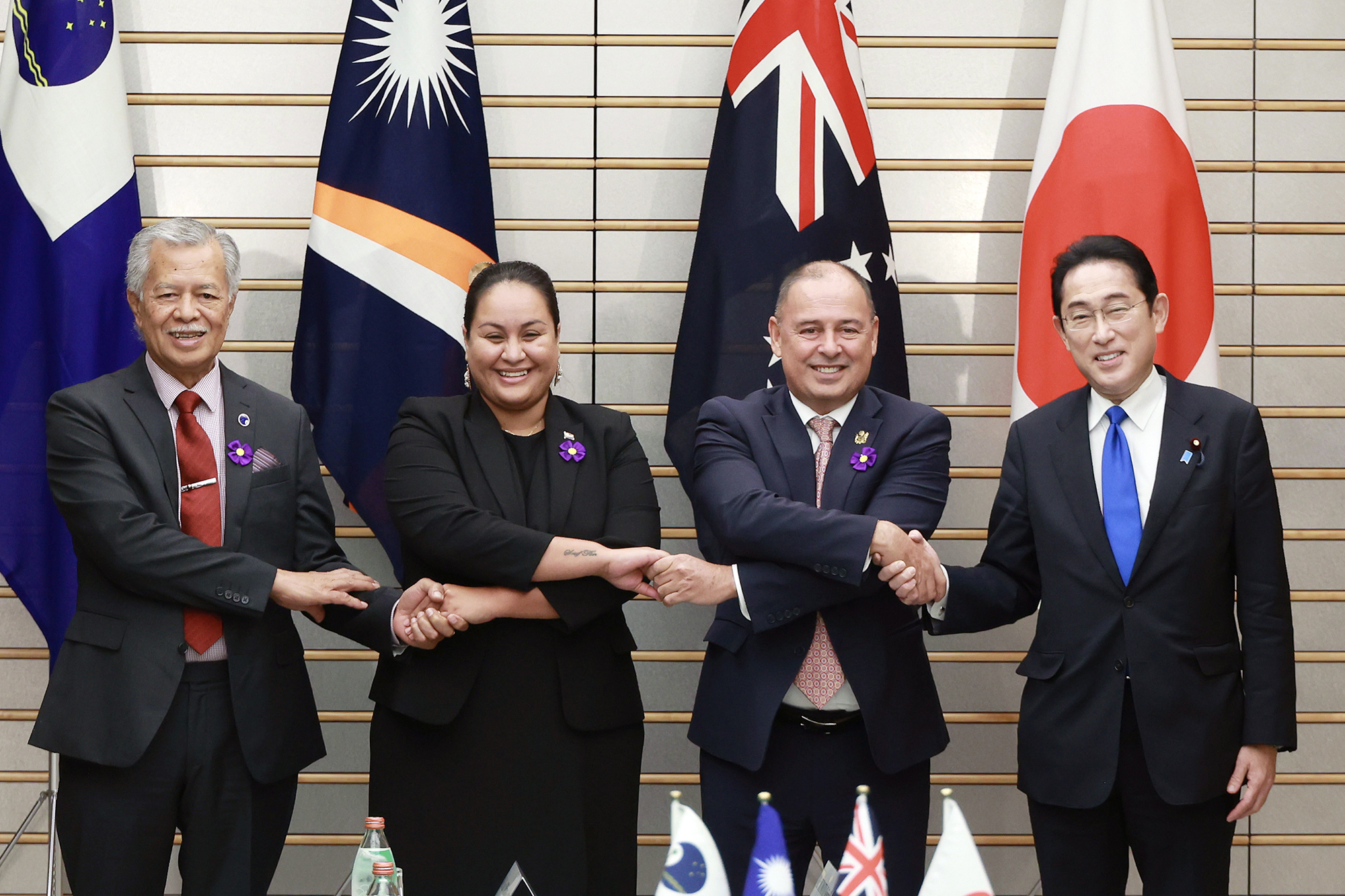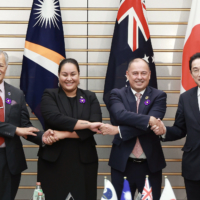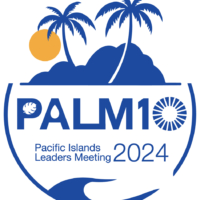The 10th Pacific Islands Leaders Meeting will kick off July 16 in Tokyo to discuss cooperation in dealing with regional issues ranging from climate change-related development assistance to collaboration on human resources to maintaining security in the region.
Since the COVID-19 pandemic forced the triennial meeting online in 2021, this is the first face-to-face PALM meeting to be held in six years.
“Japan has been regularly holding it for more than 25 years, inviting all the heads of state of this region,” said Takehiro Kurosaki, an associate professor at Tokai University who specializes in international relations among Pacific island countries, noting that there is no such meeting consistently hosted by one country alone. “In that sense, it is a unique and highly regarded tool of Japanese diplomacy.”
This year’s three-day summit comes as some of the world’s major economies, including the U.S. and China, seek more engagement with the Pacific islands amid the region’s growing geopolitical importance.
Kurosaki stressed that the leaders’ meeting is a significant opportunity for Japan to ramp up its presence in the resource-rich region while maintaining its unique position as an independent partner of it.
Key trade partner
Japan hosted the first PALM in 1997, hoping to strengthen its ties with Pacific island countries.
The members include 14 countries — the Cook Islands, Fiji, Kiribati, the Marshall Islands, Micronesia, Nauru, Niue, Palau, Papua New Guinea, Samoa, the Solomon Islands, Tonga, Tuvalu and Vanuatu. Other participants include Australia, French Polynesia, New Caledonia and New Zealand, according to the Foreign Ministry.
The region has been an extremely important trade partner for Japan, especially when it comes to natural resources.
“For example, Papua New Guinea has been exporting liquefied natural gas since 2014, and half of the natural gas exported from Papua New Guinea comes to Japan,” Kurosaki said, adding that 5% of Japan’s overall LNG imports come from Papua New Guinea. “When you consider the places where natural gas is found, such as Russia or the Middle East, it is very important to secure a stable supply of natural resources.”
Kurosaki also pointed out that Japan imports significant quantities of marine products from the South Pacific, such as bonito and tuna, and that the region serves as an important trading route for Japan because most of the goods it imports from Australia, Europe and other regions pass through this area.
“Without a stable security situation in this region, it would be impossible for Japan to trade with the rest of the world, so it is an extremely important area,” he said.
China’s growing influence
Apart from PALM, the region has a leading political organization called the Pacific Islands Forum (formerly known as the South Pacific Forum), which was founded in 1971 under the initiative of New Zealand. They meet regularly every year to discuss common issues of concern in the region.
Since Japan is not a member of the PIF, it hoped to create its own relationship with the islands, according to Izumi Kobayashi, president of the Japan Pacific Islands Association and a professor at Osaka Gakuin University.
Kobayashi said at a recent news briefing that China’s growing interest in the Pacific region has become more visible in the past two decades. Shortly before the fourth PALM in May 2006, China invited six Pacific island countries it had diplomatic relations with to hold a Chinese version of the summit, offering a commitment to provide ¥40 billion ($249 million) in aid over three years, he said.
Taiwan factor
Since then, China has flexed its diplomatic muscles to reach out to the Pacific islands and thus target Taiwan with its growing influence. In recent years, China has pressured island nations with diplomatic ties with Taiwan to abandon their recognition of Taiwan as an independent state, with Kiribati and the Solomon Islands doing so in 2019. Most recently, Nauru also cut ties with Taipei after Taiwan’s new president, Lai Ching-te, was elected in January.
China also concluded a security pact with the Solomon Islands in 2022.
Currently, only three of the 14 Pacific island nations maintain diplomatic relations with Taiwan, but experts say those countries will not easily drift toward China as Taiwan works very closely with the United States. These small nations are also aware of the importance of maintaining “balanced diplomacy” to avoid getting involved in conflicts between major powers.
Just like the assistance provided by the Japan International Cooperation Agency, Taiwan provides these nations with important assistance in nutrition, education, agriculture, medical care and disease control, according to Hideyuki Shiozawa, senior program officer of the Pacific Island Nations Program Team at the Sasakawa Peace Foundation.
“It is appreciated by the people because they continue to provide the same assistance in the same areas for a long time,” he said.
On the contrary, Shiozawa pointed out that China’s strength is its ability to swiftly complete huge infrastructure projects.
A sports stadium it erected in the Solomon Islands before the Pacific Games late last year is a good example. The continental multisport event for countries and territories in Oceania is held every four years, like the Olympics.
U.S. approach
Alarmed by China’s actions, other major economies, such as France and Indonesia, have initiated similar meetings with the leaders of island countries. In 2022 and 2023, the U.S. invited leaders from the South Pacific to Washington, pledging nearly $800 million in economic aid at the second summit last year.
“In the early days, creating a venue for the heads of state to get together and have direct dialogues in Japan was important. But as more and more countries started hosting similar leaders’ summits, it became apparent that PALM needed to do more,” Shiozawa said.
Shiozawa said Japan should learn from the U.S. approach and break out of the old way of doing things.
“In the U.S., people from various government agencies, who are from all levels and fields, hold individual meetings when heads of state and government arrive. They discuss what kind of things they are going to do on a practical basis. That’s what the Pacific island nations originally wanted to do,” he said.
“They want to discuss the real issues with each other and solve them at the summit.”
In that sense, the 10th PALM is about taking the summit to the next stage, said Tokai University’s Kurosaki.
Pointing out the fact that the island countries are not happy to be forced to join one camp or the other, he said Japan should set aside political agendas and put forward its support as an equal partner in building the region’s future.
“I hope Japan will be able to present its message in a way that takes PALM to the next stage,” he said.
Other experts pointed out that Japan remains in a different position than other donor countries and former colonial powers.
“Japan is a partner that has built its relationship for decades and has built connections with people in the region. I think it is important to further deepen such relationships and that will give Japan a uniqueness that is a little different from the U.S., Australia, and other countries,” Kurosaki said.





